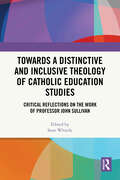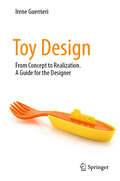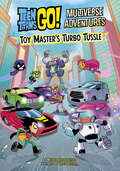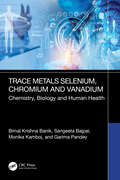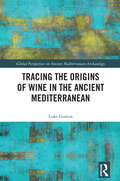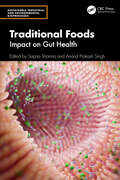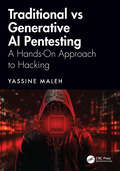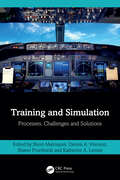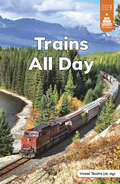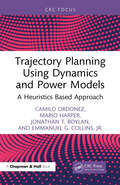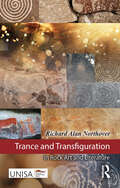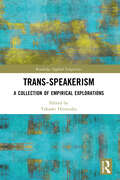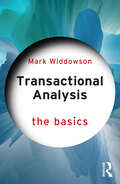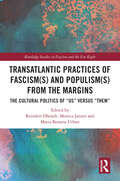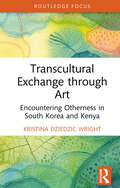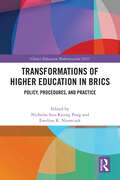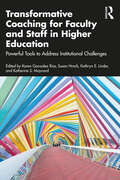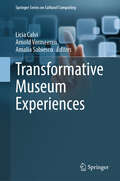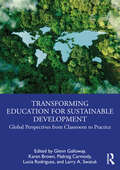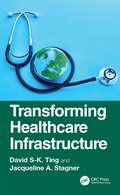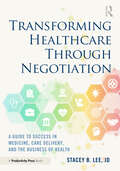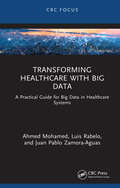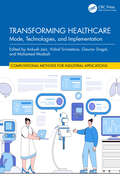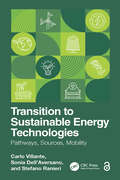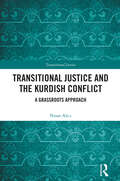- Table View
- List View
Towards a Distinctive and Inclusive Theology of Catholic Education Studies: Critical Reflections on the work of Professor John Sullivan
by Sean WhittleCasting a light on one of the leading British scholars working in the field of Catholic Education Studies, this edited volume scrutinises contemporary issues surrounding the scholarship of John Sullivan over the past three decades, demonstrating the field’s development under his scholarly influence.Giving voice to many internationally established and leading Catholic education scholars, chapters review and critically appraise the contribution of Sullivan’s work in key areas such as his call for a coherent philosophy of Catholic education; a broader, more inclusive Catholic culture; robust teacher formation; and a coherent understanding of Catholic higher education. The book also discusses the interplay between the pastoral and the prophetic – two complementary aspects that underpin much of Sullivan’s work.Ultimately posing questions for how Catholic educators can and should build on Sullivan’s foundational legacy, this book will appeal to scholars, researchers and postgraduate students in the fields of religious education, history of education and Catholic educational studies more broadly.
Toy Design: From Concept to Realization. A Guide for the Designer
by Irene GuerrieriThis book teaches readers the essential knowledge they need to design toys. It is a stimulating guide for those eager to learn the tools of the trade and offers an enlightening account, full of original ideas, for anyone passionate about the wonderful world of children and education. Designing toys is, above all, about learning to listen and appreciate the beauty within us and around us - with the naivety, freshness, and curiosity of children. It is about knowing how to choose the right shapes and colors to communicate that beauty effectively. This book is a liberating introduction that unlocks creativity, allowing readers to bring their ideas to life. Cover image: Fork-ship, Traffic line, Fratelli Guzzini (2017), design Irene Guerrieri.
Toy Master’s Turbo Tussle
by Michael Anthony SteeleToy Master has unleashed giant toy monster trucks on Jump City—and the Teen Titans need their trusty T-Car to battle the baddie. But when Beast Boy uses a jerry-rigged remote control, the heroes find the Turbo Titans parked in their garage instead. While their car counterparts are super-cool, teaming up with them proves difficult when the rubber meets the road. Can the Teen Titans find hot rod harmony with the Turbo Titans? Or will their turbo tussle with Toy Master end in tragedy? Find out in this hilariously mixed-up Multiverse chapter book for fans of Teen Titans Go!
Trace Metals Selenium, Chromium and Vanadium Chemistry, Biology & Human Health: Chemistry, Biology and Human Health
by Bimal Krishna Banik Sangeeta Bajpai Monika Kamboj Garima PandeyTrace elements selenium, vanadium and chromium play an essential role in the nutrition of both animals and humans. Their accumulation in various environments and the subsequent transition of these elements into the food chain significantly affect human and environmental health. This volume emphasizes the integrative aspects of selenium, vanadium and chromium with chapters dedicated to their fundamental chemistry, biochemistry, clinical science and environmental effects. Each chapter focuses on the advancement of scientific knowledge about these trace elements. Important studies on these elements will be described through interdisciplinary approaches. Emphasizes chemistry, biology, and toxicology of trace elements Se, V & Cr helping readers to understand their cycle in environment and effects on humans. Focuses on three important trace minerals and their recent research involving improvement of human health. Timely presentation of research being conducted on the roles of Se, V, Cr in health and disease.Addresses usefulness of trace metals in food science & nutrition, unlike other books. Distinctively presents extensive and integrative information of the fundamental aspects of Selenium, Vanadium, and Chromium in an easy to read format.
Tracing the Origins of Wine in the Ancient Mediterranean (Global Perspectives on Ancient Mediterranean Archaeology)
by Luke GortonThis book examines the origins and spread of wine from its earliest beginnings until the time of the Roman Empire, with a special focus on heretofore-underexamined lines of evidence.Building upon the extraordinary body of research conducted within the past thirty-plus years on the origins and spread of wine as described by material evidence, particularly evidence gleaned from palaeobotanical and biomolecular approaches, this book expands upon that research by closely examining ancient literary and linguistic evidence. By carefully considering varying types of evidence, a fuller narrative of the spread of wine and wine culture is created than has been achieved previously. First, literary testimony from extant ancient cultures is examined to ascertain early narratives about the origins and spread of wine. Next, linguistic evidence, particularly an analysis of the history of the 'wine' word found across the Mediterranean and ancient Near East, is considered in order to further understand issues of timing and agency related to the spread of wine in antiquity. Finally, the testimony of these lines of evidence is synthesized with current perspectives from other fields in order to paint a cohesive picture of not just how and when wine and its culture spread but also which groups played a key role.This book is for researchers in archaeology, ancient history, and historical linguistics interested in the rapidly growing research on ancient wine.
Traditional Foods: Impact on Gut Health (Sustainable Industrial and Environmental Bioprocesses)
by Sapna Sharma and Anand Prakash SinghTraditional Foods: Impact on Gut Health delves into the profound influence of traditional foods and dietary interventions on gut health, immune modulation, and disease prevention. This comprehensive book unites ancient culinary wisdom with contemporary scientific advancements, presenting a detailed exploration of traditional food practices, their phytochemical properties, and their profound impact on digestive and overall health.Drawing from a multidisciplinary perspective, the chapters traverse diverse topics such as the historical and nutritional value of traditional foods, the gut health benefits of millets, phytochemicals and their chemistry, the dynamic interplay of fermented foods and microbiomes, and strategies for food allergy management. Special emphasis is placed on critical health concerns, including gut-associated cancers, liver disorders, leaky gut syndrome, and the emerging roles of biopolymers in cancer treatment.By integrating state-of-the-art research with historical practices, this volume serves as an invaluable resource for researchers, health professionals, and anyone intrigued by the science of food and health. Real-world case studies, illustrative examples, and cutting-edge insights offer a bridge between cultural heritage and modern medicine, showcasing the transformative power of food as medicine.
Traditional vs Generative AI Pentesting: A Hands-On Approach to Hacking
by Yassine MalehTraditional vs Generative AI Pentesting: A Hands-On Approach to Hacking explores the evolving landscape of penetration testing, comparing traditional methodologies with the revolutionary impact of Generative AI. This book provides a deep dive into modern hacking techniques, demonstrating how AI-driven tools can enhance reconnaissance, exploitation, and reporting in cybersecurity assessments.Bridging the gap between manual pentesting and AI automation, this book equips readers with the skills and knowledge to leverage Generative AI for more efficient, adaptive, and intelligent security testing. By blending practical case studies, hands-on exercises, and theoretical insights, it guides cybersecurity professionals, researchers, and students through the next generation of offensive security strategies.The book offers comprehensive coverage of key topics, including: Traditional vs AI-Driven Pentesting: Understanding the evolution of security testing methodologies Building an AI-Powered Pentesting Lab: Leveraging Generative AI tools for reconnaissance and exploitation GenAI in Social Engineering and Attack Automation: Exploring AI-assisted phishing, deepfake attacks, and deception tactics Post-Exploitation and Privilege Escalation with AI: Enhancing persistence and lateral movement techniques Automating Penetration Testing Reports: Utilizing AI for streamlined documentation and risk analysis This book is an essential resource for ethical hackers, cybersecurity professionals, and academics seeking to explore the transformative role of Generative AI in penetration testing. It provides practical guidance, in-depth analysis, and cutting-edge techniques for mastering AI-driven offensive security.
Training and Simulation: Processes, Challenges and Solutions
by Dennis A. Vincenzi Shem Malmquist Shawn Pruchnicki Katherine A. LemosDeveloping training and simulation is a complex business. From understanding human performance design, usability and the limitations of training types to considerations with virtual reality (VR), producing realistic scenarios and even helping accident investigations leaves the practitioner with almost an overwhelming challenge. However, they know that their goal is to cut out developing methods that can train and test the sharp-end professional to be ready for any eventuality whether in the air, a chemical plant or the operating room. Through chapters written by leading experts, this book aims to address the key questions and concerns when developing training and simulation in high-risk industries.This book identifies unexplored challenges and weaknesses in the aviation domain, including ground-based training and flight simulation compared to the real world of in-flight complex aircraft operations, aviation accidents and incidents, airspace and air traffic control, aeronautical communications, air navigation, aircraft automation, and pilot certification and testing.These concerns are not just relevant to aviation, however. This book pushes beyond aviation to include other fields, including petrochemical and medicine, that, while on the surface are different, include some of the same human and organizational challenges.It integrates machine challenges with human factors science and includes a view of the corporate influences on training. Safety is a consideration in all the challenges and current limitations in training and simulation, and the book is written with the intention of improving both training and safety as industries deal with more and more complex advanced technology.Underpinned by case studies and real-life examples, this book will give the reader a thorough overview of the limitations of current training methods but with a view to improving and developing better methods for future training scenarios. Opportunities and solutions are presented for current or future research and the application and incorporation of these in day-day operations.Training and Simulation: Processes, Challenges and Solutions will appeal to practitioners of human factors, training, pilots and ground operators, engineers involved in systems design, safety specialists, test evaluators, and accident investigators across multiple domains.
Trains All Day
by Marley RichmondTrains run every day, carrying people and goods to their destinations. Beginning readers hone their phonics skills while learning about the important roles trains play in our communities. As readers practice decoding words with the long vowel teams ai and ay, they gain nonfiction knowledge. Every Stairway Decodables book combines multiple aspects of the Science of Reading to support small group instruction, independent reading, and reading practice at home.
Trajectory Planning Using Dynamics and Power Models: A Heuristics Based Approach
by Camilo Ordonez Mario Harper Jonathan T. Boylan Emmanuel G. Collins, Jr.This book shows how to plan trajectories (i.e. time-dependent paths) for autonomous robots using a dynamic model within the A* framework.Drawing from optimal control's model predictive control framework, the book develops a paradigm called Sampling Based Model Predictive Optimization (SBMPO), which generates graph trees through input sampling of a dynamic model, enabling A*-type algorithms to find optimal trajectories. The book covers various robotic platforms and tasks, including manipulators lifting heavy loads, mobile robots navigating steep hills, energy-efficient skid-steered movements, thermally informed space exploration planning, and climbing robots in obstacle-rich environments. It also explores methods for updating dynamic models for robust operation and provides sample code for applying SBMPO to additional problems.This resource is aimed at researchers, engineers, and advanced students in motion planning and control for robotic and autonomous systems.
Trance and Transfiguration in Rock Art and Literature (Routledge/UNISA Press Series)
by Richard Alan NorthoverThe book is a largely unprecedented inter-disciplinary collaboration between archaeology, anthropology, and literary studies, although it touches on philosophy and religious studies, too. It explores the creative ways that altered states of consciousness play in culture and the arts, whether these states are induced though rituals like the trance dance or meditation, or through the consumption of mind enhancing substances.The author explores altered states of consciousness present in select Anglophone literature illuminated by archaeological research on trance states in relation to rock art. This specifically concerns the shamanistic theory of David Lewis-Williams.In response to Northover, Wayne Stables relates it to the Western philosophical tradition, seeing altered states and the loss of the sense of self that these usually involve as a critique of Western individualism. Contributions by David Whitley and Francis Thackeray are primarily concerned with the creative role that mind-altering substances play in culture. Also stepping into the conversation, Dan Wylie’s reflections are critical, even sceptical, about the use of psychedelics and opiates for recreational, religious and creative purposes. Wylie’s references to Southern African literature complements Whitley’s discussion of North American texts and Northover’s focus on Anglophone literature.Overall, the book creates by way of multiple perspectives a multivoiced dialogue on the currently highly debated topic of the use of mind-enhancing substances and techniques in art, culture, therapyand religion. In addition to the more academic material, blogs written by two of the authors are included to contextualise and broaden the discussion. This aligns with the book’s multivocal and multimodal spirit.Print editions not for sale in Sub-Saharan Africa.
Trans-speakerism: A Collection of Empirical Explorations (Routledge Applied Linguistics)
by Hiratsuka, Edited by TakaakiThis pioneering exploration of trans-speakerism takes readers on a journey that redefines the foundations of language education discourse. This edited volume serves as a vital contribution—bringing together assorted empirical studies and discussions contributed by scholars with various linguistic backgrounds and scholarly experiences from around the world to confront and deconstruct the enduring influence of native-speakerism.At the heart of this work is the innovative concept of trans-speakerism, which moves beyond historical bifurcated markers for language speakers. Via the adoption of all-embracing terminology—global speakers of English (GSEs), global teachers of English (GTEs), and global Englishes researchers (GERs)—we propose a richer, more contextual understanding that shines a light on individual agency and multiplicity. This volume therefore stands out not only for its theoretical insights but also for its ability to inspire change. We demonstrate new ways to visualize entrenched power dynamics in language education by asserting the strengths and experiences of all practitioners and researchers, whilst honoring their multifaceted identities beyond reductive linguistic categorizations.Framing language education and its related fields through the prism of trans-speakerism unveils new possibilities for both practitioners and researchers to refurbish traditional hierarchies and herald a future of inclusive excellence.
Transactional Analysis: The Basics (The Basics)
by Mark WiddowsonThis accessible textbook on transactional analysis (TA) provides a comprehensive overview of TA theory, with a strong emphasis throughout on practical application.The core theory of TA is explained, as well as how concepts have developed over time. Each theoretical concept is presented with brief examples or vignettes from different fields of application of TA (such as psychotherapy, counselling, education and organisational) and – crucially – how TA can be used in everyday life. To facilitate the learning of concepts, the book includes personal development activities at the end of chapters together with suggestions for further reading.This is an essential text for complete beginners and first year students on TA training courses as well as students on counselling and psychotherapy training, and those undertaking training in organisational development and coaching.
Transatlantic Practices of Fascism: The Cultural Politics of “Us” versus “Them” (Routledge Studies in Fascism and the Far Right)
by Reindert Dhondt, Monica Jansen and Maria Bonaria UrbanThis volume brings together leading international experts in politics, discourse, memory, and culture to examine the complex entanglements of populism(s) and fascism(s) in political thought and cultural productions. The starting point is Argentine historian Federico Finchelstein’s assertion that the dynamics of transnational fascism and populist movements become clearer when viewed from the margins. Indeed, it was in Latin America – not Europe – where fascism and populism first intersected, with Argentine Peronism as the paradigmatic case.Building on this perspective, the volume explores Europe’s political and cultural legacy of fascism within the context of globalised mobilities, linking its totalitarian roots to the Latin American genealogies of populism(s). Adopting an interdisciplinary transnational and transhistorical approach, and cultural transfer as a method, it investigates cultural representations and practices that both reflect and challenge the divisive “Us” versus “Them” rhetoric central to fascist and populist discourses. Particular attention is given to how cultural artefacts and practices memorialise, remediate, and oppose narratives of fascism(s) and populism(s), with the assumption that (anti)fascist art and activism still move along transatlantic trajectories.This book will be of interest to researchers of fascism, populism, social and cultural history, European and Latin American history, literature, art, and activism.
Transcultural Exchange through Art: Encountering Otherness in South Korea and Kenya
by Kristina Dziedzic WrightTranscultural Exchange through Art provides an exploration of two countries and their capital cities, two regions and their growing cultural engagement with one another, soft and hard power and their impact on the arts, multiculturalism, museums, globalization, cosmopolitanism and postcoloniality.Drawing on the author’s experiences of working in Kenya and living in South Korea, as well as interviews with artists, curators and other practitioners, the book demonstrates that experiencing “otherness” through the imaginative engagement of art can cultivate appreciation of cultural diversity. Various case studies from Nairobi and Seoul are analyzed to unpack narratives about nation, self and other through the cultural and creative industries. By focusing on two non-Western regional capitals whose urban contemporary development is affected by their colonial pasts, the book explores the larger dynamics of postcolonial nation building and the formulation of cultural identities in the face of rapid economic development and demographic changes. The issues identified in the study are linked to wider debates concerning the role of the arts and art museums in relation to migration, globalization and multiculturalism.Transcultural Exchange through Art will be of great interest to academics and practitioners working in the cultural and creative industries, museum and curatorial studies, visual culture studies, African studies and Asian studies. The book transcends disciplinary boundaries and relates academic research to pragmatic issues such as diversity and inclusion in public cultural spaces.
Transformations of Higher Education in BRICS: Policy, Procedures, and Practice (China's Education Modernization 2035)
by Ewelina K. Niemczyk Pang, Nicholas Sun-KeungThis book aims to study the current transformations of higher education in the Brazil, Russia, India, China, and South Africa (BRICS) countries. The conditions imposed by the Covid pandemic exposed many vulnerabilities in higher education systems, but also provided valuable lessons that led to the implementation of effective changes.Educational changes are being applied to programmes, projects, practices, and policies with varying degrees of success depending on the context: the needs of students and staff have changed, and considerable attention has been given to the effective continuation of all academic activities through the use of technology; often the nature of higher education and its role in society are being contemplated and ways of sustainable development are being debated. Therefore, contributors from the five BRICS member states present research findings and critical views on the recent development of higher education in their own countries, providing an opportunity for a unified effort and collective input to explore the transformation and reform of higher education.This book is intended for researchers, policymakers, and postgraduate students in higher education, educational governance, and comparative education.
Transformative Coaching for Faculty and Staff in Higher Education: Powerful Tools to Address Institutional Challenges
by Karen Gonzalez Rice Kathryn E. Linder Susan Hrach Katherine S. MaynardThis wide-ranging collection explores how to integrate coaching into higher education in ways that tackle some of the most pressing challenges facing institutions today. By embracing coaching as a powerful tool for growth and change, faculty and staff can navigate complexities, foster innovation, and cultivate thriving academic communities.Drawing on the expertise of seasoned academic coaches, the authors provide a rich, multifaceted exploration of coaching’s potential to drive individual transformation and institutional success. With insights grounded in diverse roles and perspectives, the chapters showcase how coaching can empower faculty and staff at every career stage. From creating authentic connections and building resilience to promoting inclusivity and inspiring structural change, this lively book is packed with the practical tools, real-life examples, and thought-provoking reflection questions necessary to develop a core, functional understanding of coaching in higher education.
Transformative Museum Experiences (Springer Series on Cultural Computing)
by Arnold Vermeeren Licia Calvi Amalia SabiescuFollowing on the volume Museum Experience Design (2018), this book acknowledges the changing role of museums in society with a focus on designing experiences as vehicles for transformation. We look at transformation through a systemic perspective, anchored in the experience that museums offer to visitors. One facet of our exploration regards the museum experience itself as an instrument for change. At this level we conceptualise what we mean by a transformative experience and look at design approaches specifically geared towards inducing transformation. We then turn attention towards the way recent changes in the socio-political and cultural context reverberated in structural and functional changes inside the museum and connected institutions and communities, with shifting museum identities and new forms of cooperation emerging. Finally, we zoom in on the role of technology in the making of transformative museum experiences, looking at opportunities and affordances but also calling for an ethical approach to integration of technology in museum practice.
Transforming Education for Sustainable Development: Global Perspectives from Classroom to Practice
by Karen Brown Pádraig Carmody Larry A. Swatuk Glenn Galloway Lucia RodriguezTransforming Education for Sustainable Development documents and disseminates learning around education for sustainable development and associated pedagogical approaches, techniques, and experiences that have been generated across the Master of Development Practice (MDP) Global Association over the past 12 years. It integrates the participation and perspectives of a diverse group of faculty, alumni, students, and partners. The book applies a critical, analytical lens to discuss experiences across 35 prestigious universities to provide an invaluable synthesis of key findings with a summary of forward-looking implications for global education for sustainable development. Chapters are developed around key dimensions of the MDP program, exploring how it has evolved since its inception in diverse regional and institutional contexts. With its focus on preparing future development practitioners for important roles in a wide range of organizations involved in different facets of sustainability, the MDP program offers a unique lens through which to learn best ESD practices and challenges faced. The book features contributions from across five continents, showcasing a broad range of educational strategies in different professional and cultural contexts to emphasize locally appropriate solutions. This will be an insightful and important read for professionals in higher education for sustainability and sustainable development, in addition to researchers, policymakers, and practitioners involved in non-profits, NGOs, and international organizations.
Transforming Healthcare Infrastructure
by Jacqueline A. Stagner David S-K. TingIn recent years, unprecedented demographic aging has placed considerable strain on outdated healthcare systems, exacerbating existing challenges and creating new ones. Geriatric care, in particular, necessitates a multidisciplinary approach involving architects and engineers alongside healthcare professionals. Emerging technologies such as artificial intelligence (AI), digital healthcare, adaptive systems, inclusive policies, and biodegradable materials offer promising avenues for systematic improvements in healthcare delivery. Transforming Healthcare Infrastructure addresses the issues of demographic aging and embracing digital transformations such as AI and offers timely insights into the evolving landscape of healthcare. It also emphasizes the necessity for all stakeholders to embrace these changes for the betterment of healthcare delivery and outcomes. This book serves as a definitive resource for healthcare professionals at all levels, from frontline workers to administrators, as well as researchers and students across various disciplines. Engineers, policymakers, architects, and environmentalists within the healthcare sector will also find it indispensable.Key Features: Offers timely insights into the evolving landscape of healthcare Explores emerging technologies such as AI, Internet of Things (IoT), adaptive systems, and biodegradable materials used for healthcare solutions Emphasizes the necessity for all stakeholders to embrace these changes for the betterment of healthcare delivery and outcomes
Transforming Healthcare Through Negotiation: A Guide to Success in Medicine, Care Delivery, and the Business of Health
by Stacey B. LeeEvery day, healthcare professionals face high-stakes negotiations that directly impact patient outcomes, organizational success, and career advancement. Transforming Healthcare Through Negotiation introduces the HEAR Approach™—a proven system developed specifically for healthcare's unique challenges across clinical care, service delivery, and business operations.This practical guide equips physicians, administrators, and healthcare leaders with immediately applicable strategies to transform potential conflicts into collaborative solutions that advance patient care while balancing competing priorities.Inside, discover: A Relational Mindset that builds trust across professional boundaries Field-tested negotiation strategies tailored to healthcare’s distinct environments Tactical approaches for maintaining momentum in time-sensitive situations Ready-to-use tools, including the Negotiation Planner and Trilingual Planner "Transforming Healthcare Through Negotiation is an essential read for healthcare leaders... Stacey Lee’s HEAR Approach™ masterfully provides a structured, relational approach that balances clinical, operational, and financial priorities."— Regina Herzlinger, PhD; Brian Walker, DrPH; Ben Creo, MDiv, Harvard Business School"The HEAR Approach™ has improved healthcare and will make you better... aligned beautifully with principles of optimal clinical practice."— James K. Stoller, MD, MS, Chair of the Education Institute, Cleveland Clinic
Transforming Healthcare with Big Data: A Practical Guide for Big Data in Healthcare Systems
by Luis Rabelo Ahmed Mohamed Juan Pablo Zamora-AguasHealthcare organizations are utilizing big data for improved data analytics and performance measurements. This book provides a comprehensive framework integrating 41 components, emphasizing data completeness for better healthcare outcomes. It provides guidelines for selecting appropriate technology and implementing solutions.Transforming Healthcare with Big Data: A Practical Guide for Big Data in Healthcare Systems presents a six-layer framework for healthcare systems, integrating organization, people, process, data, technology, and outcomes. It discusses big data analytics, predictive risk assessments, and the benefits of combining it with artificial intelligence, machine learning, and deep learning technologies. It also guides planning big data analytics solutions, tracking KPIs, and optimizing healthcare operations for cost reduction without compromising care quality.Healthcare executives, administrators, IT professionals, data scientists, analysts, clinical and operations managers, consultants, researchers, academics, policymakers, and graduate students in health informatics and industrial engineering can all benefit from this book by gaining a comprehensive and practical framework for effectively implementing big data analytics in healthcare. This will enable improved patient outcomes, cost efficiency, and operational excellence.
Transforming Healthcare: Mode, Technologies, and Implementation (Computational Methods for Industrial Applications)
by Ankush Jain, Vishal Srivastava, Gaurav Singal, and Mohamed MosbahThis comprehensive volume explores cutting-edge technologies, groundbreaking methodologies, and insightful ethical considerations. It brings together leading minds and research across diverse domains, offering readers a glimpse into the future of healthcare. From leveraging AI in diagnostics and personalized treatments to advancing telemedicine and remote patient monitoring, the text addresses real-world challenges and opportunities in the rapidly evolving healthcare industry.Key features: Innovative approaches to early disease detection, including Alzheimer’s and cancer, using machine learning and deep learning techniques. State-of-the-art applications of design thinking, meta-heuristics, and federated learning in healthcare. Ethical perspectives on the use of AI technologies and their impact on businesses and patient care. A deep dive into the role of IoT, NLP, and AI-driven image processing in revolutionizing healthcare delivery. Generalized models analyzing trade credits and their implications for healthcare supply chains. Whether you're a researcher, healthcare professional, or technology enthusiast, this book serves as an invaluable resource for understanding and shaping the future of health technologies. Packed with diverse perspectives and actionable insights, it’s a must-read for anyone passionate about making a difference in healthcare.
Transition to Sustainable Energy Technologies: Pathways, Sources, Mobility
by Carlo Villante Sonia Dell'Aversano Stefano RanieriThis book explains the challenges related to global energy transition, focusing on decarbonization, renewable technologies, and sustainable mobility. It offers a comprehensive exploration of integrated socio-economic, environmental, and technological perspectives and provides actionable solutions and practical pathways for transitioning to sustainable energy systems. Designed to be used in short academic courses, this textbook is an excellent foundational text for upper-level undergraduate and graduate students in engineering and environmental sciences taking specialized courses in energy systems, renewable technologies, climate change mitigation, and environmental impacts. It is also a great resource for professionals and policy makers involved in energy projects.Features: Offers an interdisciplinary approach to energy transitions combining theoretical frameworks with practical applications. Explores the full spectrum of energy systems, comparing conventional to renewable sources, energy vectors, and energy-storage technologies. Incorporates real-world data from leading institutions and integrates key historical milestones like the Paris Agreement with forward-looking trends. Highlights cutting-edge innovations, including solar and wind energy, hydrogen, energy-storage systems, synthetic fuels, and smart grids, and emphasizes their integration into energy systems and sustainable mobility solutions. Bridges the gap between socio-economic, environmental, and technological perspectives. The Open Access version of this book, available at http://www.taylorfrancis.com, has been made available under a Creative Commons Attribution-Non Commercial-No Derivatives (CC BY-NC-ND) 4.0 license.
Transitional Justice and the Kurdish Conflict: A Grassroots Approach (Transitional Justice)
by Nisan AlıcıCentralising the experience of victims-survivors and other grassroots actors, this book examines how transitional justice can be used in transforming the Kurdish conflict in Turkey.Despite 40 years of armed conflict, its violent effects on Kurdish people and the wider society, and strong demands for justice, there is little work on transitional justice in the context of the Kurdish conflict. In response, this book explores the limits and potentials of transitional justice in Turkey’s ongoing conflict by focusing on the perspectives of victims-survivors and grassroots justice activists. Such perspectives have received little attention in the transitional justice literature, even as it has exhibited an increasing interest in contexts where no formal transition has taken place. But, as this book demonstrates, the Kurdish conflict reveals the importance, not only of documenting these perspectives, but in seeing how those most affected by conflict are able to transform their experience into political action. Drawing on Kurdish victim-survivors’ own understandings of their experiences and activists’ perceptions of the potential of transitional justice, the book thereby addresses, and advocates, the transformative potential of bottom-up, grassroots-level efforts to deliver transitional justice goals.This book will appeal to transitional justice scholars and practitioners, those with interests in the role of social movements, as well as others with interests in the Kurdish conflict or in Middle Eastern politics more generally.
